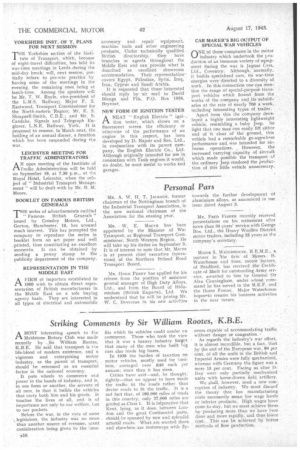Striking Comments by Sir William Rootes, K.B.E.
Page 18

If you've noticed an error in this article please click here to report it so we can fix it.
AMOST interesting speech to the Maidstone Rotary Club was made recently by -.,Sir William Rootes, K.B.E. He said that transport is rise life-blood of modern existence, and a vigorous and enterprising motor industry, as the parent of transport, should be esteemed as an essential factor in the national economy. _ It puts wheels to commerce and power in the hands of industry, and is, in one form oranother, the servant of all men, in that it builds the vehicles that carry both him and his goods. It touches the lives of all, and is of importance not only to our welfare, but to our pockets.
Before the war, in the eyes of some \ legislators, the industry was no more than another -source -of. revenue, scant conSideration being given to the.!)ene a1.6 fits which its vehicles could confer en commerce, Those who took the view that it was a luxury industry forgot that many of the men who built big cars also made big buses.
In 1938 the burden of taxation on motor Vehicles, mostly used for business, averaged over £40 each per annum; since then it has risen.
Critics have said—and, .he thought; rightly—that we appear to have made the traffic fit the roads rather than devise roads to fit the traffic. It is a sad fact that, of 180,000 miles of roads in this country, only 27,000 miles are graded as _Class I. It is in-lperative that Kent, lying, as it does, between London and the great Continental ports, should be spanned by new and splendid arterial roads. What are wanted there and elsewhere are motorways with By
overs capable of accommodating traffic without danger or congestion. •
As regards the industry's war effort, it is almost incredible, but a fact, that by the end of .the European war, 80 per cent, of all the units in the British and Imperial Armies were fully mechanized, whereas with Germany the figure was a mere 15 per cent. Facing us. after I)Day were only partially mechanized units with horse-drawn field artillery.
We shall, however, need a new conception of industry. We must discard' the theory that low manufacturing costs necessarily mean low wage levels or inferior products.. High wages have come to stay, hut we must achieve these by producing more than we have ever done and more rapidly,, and thus lower cost. This can be achieved by -better methods of floss production.




















































